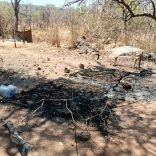Mozambique: REN stake in Cahora Bassa important for Portugal - HCB chair
Mozambique is “an emerging energy power”

Speaking in New York at the opening of a Forum on Energy in Africa, organised by the Atlantic Council, Chapo said that, on current forecasts, Mozambique could be responsible for 20 per cent of Africa’s energy production by 2040. This would make it one of the ten largest energy producers in the world. [Photo: Presidency of the Republic of Mozambique]
Mozambican President Daniel Chapo on Tuesday described Mozambique as “one of the emerging powers in the energy sector in Africa”.
Speaking in New York at the opening of a Forum on Energy in Africa, organised by the Atlantic Council, Chapo said that, on current forecasts, Mozambique could be responsible for 20 per cent of Africa’s energy production by 2040. This would make it one of the ten largest energy producers in the world.
Among the country’s energy achievements, Chapo pointed to the construction in Temane, in the southern province of Inhambane, of what will be the largest power station built since independence in 1975. Fired by Mozambique’s own natural gas, this will generate 450 megawatts.
A new hydro-electric dam and power station will be built at Mpanda Nkuwa, on the Zambezi river, in Tete province, about 60 kilometres downstream from the existing dam at Cahora Bassa. Mpanda Nkuwa will add 1,500 megawatts to Mozambique’s generating capacity.
As for the Cahora Bassa dam itself, Chapo said it is undergoing modernisation, rehabilitation, and expansion, including the construction of a second power station on the north bank of the river “to boost its reliability and expand its contribution”.
“At the same time”, Chapo added, “we are diversifying the electricity matrix with robust investments in solar, wind and thermal power, taking advantage of abundant natural resources and favourable climatic conditions”.
Through such initiatives, Mozambique “is laying the foundations to become a true energy hub, at the service of the industrialisation of southern Africa”, he said.

Energy was not an end in itself, stressed Chapo, but “a means to transform the lives of our fellow citizens, to industrialise Mozambique, to create jobs for millions of young people, to build the capacity of women, to create manufacturing industries and to reduce poverty”.
While Africa is the continent responsible for least pollution, he said, it is also “the continent most vulnerable to climate change. We are therefore calling for active solidarity from our international partners in financing the energy transition, in supporting climate adaptation and in strengthening the resilience of our communities”.
He stressed that “Africa is not just a continent of challenges. With abundant reserves of cobalt, copper, graphite and lithium, we possess the resources the world needs to build green and resilient value chains”.
“In Mozambique we think it is possible to transform these resources into African batteries, African vehicles, and African green industries, for the benefit not only of Africa, but of the entire world”, Chapo declared.
“We want to transform our potential into shared prosperity, resting on climate justice, social inclusion, and sustainable industrialisation”, he said.












Leave a Reply
Be the First to Comment!
You must be logged in to post a comment.
You must be logged in to post a comment.